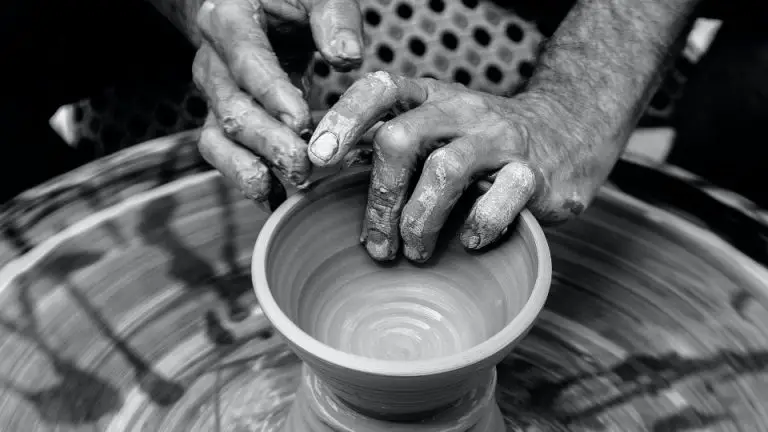What Does God Mean By Jars Of Clay?
The biblical reference to “jars of clay” comes from 2 Corinthians 4:7 in the New Testament, where the apostle Paul writes, “But we have this treasure in jars of clay to show that this all-surpassing power is from God and not from us.”
In this verse, Paul uses the metaphor of “jars of clay” to refer to human beings. Just as clay jars and vessels in ancient times would have been ordinary, fragile, and prone to cracking, we as humans are imperfect, vulnerable, and weak. However, Paul goes on to explain that God has placed His treasure – the light and glory of the gospel message – within these “jars of clay.”
Even though we are ordinary clay vessels, easily broken and inadequate on our own, God chooses to work through us and manifest His glory, power, and purpose using our fragile humanity. The treasure inside is not our own doing – it comes from God. This highlights how God’s power shines brighter and becomes more evident when working through and within our human weaknesses and limitations. The metaphor emphasizes that the glory belongs to God alone.
Meaning of Clay in the Bible
In the Bible, clay is often used as a metaphor to represent the fragility and imperfection of humanity. The Book of Job states that humanity are “houses of clay” (Job 4:19), indicating the temporary and fragile nature of human life. The prophet Isaiah declares that people are the “clay” and God is the “potter” (Isaiah 45:9; 64:8), showing how humanity is shaped, molded, and formed by the hands of God. Paul also used this metaphor in Romans 9:21 when he spoke of some “vessels for honorable use” and others “for dishonorable use.”

Clay in the Bible emphasizes the weaknesses and faults inherent in humanity. Just as clay pots are fragile and prone to cracks or breaking, people are imperfect and fallible. Yet God as the Master Potter can still mold weak clay into something beautiful and useful for His purposes. As Job 10:9 (NASB) says, “Remember now, that You have made me as clay; And would You turn me into dust again?” This highlights humanity’s humble origins from dust and clay, dependent on the Creator.
So in summary, the fragility of clay in Biblical imagery underscores the impermanence, inadequacy, and faults of humankind. Yet it also shows people’s God-given potential to be reshaped and remade according to His will and design.
Sources:
https://www.biblestudytools.com/dictionary/clay/
https://av1611.com/kjbp/kjv-dictionary/clay.html
Clay as a Metaphor for Humanity
In the Bible, clay is often used as a metaphor for humanity. This metaphor emphasizes several key aspects of human nature:
Weakness – As the prophet Isaiah states, “We are the clay, and You our potter; And all we are the work of Your hand” (Isaiah 64:8). Compared to God, humans are fragile and weak, just as clay is much weaker than the potter who shapes it.
Imperfection – Clay in its natural state is messy, malleable, and full of impurities that must be refined out of it. The metaphor conveys that humans are also imperfect and sinful by nature (Romans 3:23). Just as clay needs to be purified and molded, people need God’s refining work in their lives.
Moldability – As clay is molded and shaped by a potter, people can be molded and shaped by God’s hands. The metaphor speaks to how God can transform human lives for His purposes, if we yield to Him. As Romans 9:21 states, “Does not the potter have power over the clay?”
Overall, the clay metaphor emphasizes human limitations and total dependence on God, who as the Master Potter lovingly molds us into the people He desires us to be.[1]
The Story of God Creating Adam
In the Genesis creation narrative, God forms the first man Adam out of clay and breathes life into him. Genesis 2:7 states, “Then the Lord God formed a man from the dust of the ground and breathed into his nostrils the breath of life, and the man became a living being.” This vivid image illustrates that Adam was made from the dust and earth, showing his connection to the ground. Yet God also imparted His divine breath into Adam, giving him a sacred, spiritual essence. Adam was both mortal and bound to the earth, yet filled with the breath of God Himself. So while Adam was formed from humble clay, he was elevated beyond this clay because of the breath of life from God. This story establishes Adam and humanity as a whole as creatures formed by God, dependent on Him for life itself.
Source: https://www.bible.com/bible/42/GEN.2.7.CPDV
Clay Jars in Paul’s Writings
The Apostle Paul uses the metaphor of clay jars in his second letter to the Corinthians. In 2 Corinthians 4:7, Paul writes, “But we have this treasure in jars of clay to show that this all-surpassing power is from God and not from us.”
The “treasure” Paul refers to is the gospel message and ministry that he and other believers carry. Though they are merely fragile clay jars, the message they carry is priceless and powerful. As earthen vessels, they are weak and prone to cracking. However, the treasure inside comes from God and has transforming power.
Paul goes on to say in verses 8-9: “We are hard pressed on every side, but not crushed; perplexed, but not in despair; persecuted, but not abandoned; struck down, but not destroyed.” Though they suffer, they persevere by God’s power at work within them.
This metaphor of being clay jars points to the contrast between the frailty of humanity and the surpassing greatness of God. Believers are cracked pots containing an invaluable gospel treasure. Despite outward brokenness, God’s light shines through their weaknesses. The power is from God, not themselves.
Paul beautifully illustrates how God uses imperfect vessels to carry priceless truth. As jars of clay, believers remain dependent on God’s strength working through human frailty. This metaphor emphasizes that the gospel’s power comes from God’s Spirit at work in His people.
Sources:
https://hermeneutics.stackexchange.com/questions/55238/was-the-use-of-metaphor-of-clay-jar-used-by-st-paul-in-2-cor-46-9-appropriat
https://www.gotquestions.org/treasures-in-jars-of-clay.html
Being Molded and Shaped by God
An important theme in the Bible is that God desires to mold and shape humanity into who He needs them to be. This process of transformation starts when we accept Jesus Christ into our hearts. At that moment, God begins actively working in our lives to transform us into the image of His Son (Romans 8:29).
The metaphor of being molded and shaped as clay in a potter’s hands illustrates how God patiently and lovingly forms us over time. Just as a potter works and reshapes clay on the wheel, God continuously works in our lives to shape our character and transform our hearts to align more with Him (Jeremiah 18:3-6).
This process can sometimes be difficult and painful, as God applies pressure to transform areas that need changing. But we must trust that He knows best how to mold us for His glory. As we surrender our lives to Him, God lovingly transforms us to be vessels He can use for His purposes (Isaiah 64:8).
If we resist God’s shaping and remain stubborn, we can become hardened and unusable for what He has planned. But if we submit to Him as the Master Potter, He will mold us into something beautiful and useful for bringing glory to His name.
Being molded by God is a lifelong journey. We may feel imperfect and cracked now, but one day His transforming work in us will be complete. Then we will be perfectly fitted for our eternal purpose—to worship the One who shaped us (Romans 9:21).
Cracks and Brokenness
God often uses the metaphor of clay jars or clay pots to represent humanity and how He works in our lives. Just as clay can be molded, shaped, and transformed by a potter, we are molded and shaped by God’s hands (Isaiah 64:8). However, clay pots are vulnerable to cracks and breakage. Similarly, as humans we are flawed, imperfect, and prone to brokenness.
But God cherishes and values cracked pots! According to 2 Corinthians 4:7, we are like jars of clay containing great treasure. The flaws and cracks allow the light within us to shine more brightly: “But we have this treasure in jars of clay to show that this all-surpassing power is from God and not from us.” As explained in an article, “God Uses Cracked Pots,” “Like the clay jars that Gideon and his soldiers broke, there a tremendous value in being broken. We throw away things when they’re broken, but God cherishes us most when we are cracked or broken” (https://gabc-archive.org/wp-content/uploads/2018/12/s093007.pdf).
Rather than hiding our brokenness, God wants us to allow His light to shine through, revealing that His power is made perfect in our weakness (2 Corinthians 12:9). Our cracks become channels for God’s glory, love, and redemption to flow out and impact others.
Clay Jars Point to God’s Glory
The metaphor of clay jars is meant to show that the great power of God can work through our human frailty and weakness. As 2 Corinthians 4:7 (https://biblehub.com/2_corinthians/4-7.htm) says, “But we have this treasure in jars of clay to show that this all-surpassing power is from God and not from us.” Though we are just cracked pots of earth, God has placed His light inside of us.
The clay jars represent our humble humanity. On our own, we are weak, fragile, and prone to cracks and breaking. But God’s power shines through our brokenness, so that His glory and might are revealed, not our own. As Paul says, the purpose is to make clear that “our great power is from God, not from ourselves” (https://www.bibleref.com/2-Corinthians/4/2-Corinthians-4-7.html).
When we realize that we are just clay jars, it points us to reliance on God’s strength rather than our own. Our flaws and weaknesses give opportunity for God’s light to shine brighter through the cracks. This humbles us while exalting God’s glorious power.
Being Transformed into New Creations
As Christians, we believe we become new creations when we accept Christ into our lives. This concept is explained by the apostle Paul in 2 Corinthians 5:17 (ESV): “Therefore, if anyone is in Christ, he is a new creation. The old has passed away; behold, the new has come.”1 What does this mean for believers?
Essentially, God begins the process of transforming us into the image of Christ when we are born again. As 2 Corinthians 3:18 (NIV) states: “And we all, who with unveiled faces contemplate the Lord’s glory, are being transformed into his image with ever-increasing glory, which comes from the Lord, who is the Spirit.”2 This is an ongoing, lifelong process of God reshaping our character to become more Christlike.
As new creations, the old sinful nature passes away and the Holy Spirit starts molding us into something beautiful and God-honoring. This doesn’t mean we become perfect, but we have a new identity and purpose in Christ. Even when we stumble and fall, God patiently continues remaking us according to His will. Our cracks and flaws allow God’s light to shine through.3 As we yield to God’s transformative work in our lives, we become His masterpieces – reflections of Christ to the world.
Being made new in Christ is a lifelong process of God restoring His image within us. As His clay jars, we are privileged to be molded and shaped by the hands of the Master Potter.
Conclusion
In summary, the metaphor of “jars of clay” in the Bible conveys some powerful truths about humanity and our relationship with God. The clay represents our frail and imperfect human nature, formed from the dust by God himself. Yet even cracked pots can contain and reveal God’s glorious light within. God patiently molds and shapes us through our experiences, and fills our brokenness with his grace. As jars of clay, we are utterly dependent on God’s mercy and empowering. Our weaknesses allow God’s light to shine all the brighter. This metaphor points to the wonder of being transformed and perfected in Christ into new creations.



